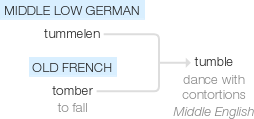Tumble
Middle English (as a verb, also in the sense ‘dance with contortions’): from Middle Low German tummelen ; compare with Old English tumbian ‘to dance’. The sense was probably influenced by Old French tomber ‘to fall’. The noun, first in the sense ‘tangled mass’, dates from the mid 17th century.
wiktionary
From Middle English tumblen(“to fall over and over again, tumble”), frequentative of Middle English tumben(“to fall, leap, dance”), from Old English tumbian, from Proto-Germanic *tūmōną(“to turn, rotate”). Cognate with Middle Dutch tumelen (whence Dutch tuimelen); Middle Low German tumelen, tummelen; and German taumeln.
etymonline
tumble (v.)
c. 1300, "to perform as an acrobat," also "to fall down," perhaps from a frequentative form of Old English tumbian "dance about, tumble, leap." This is of unknown origin but apparently related to Middle Low German tummelen "to turn, dance," Dutch tuimelen "to tumble," Old High German tumon, German taumeln "to turn, reel." Transitive sense from late 14c. Related: Tumbled; tumbling.
tumble (n.)
"accidental fall," 1716, from tumble (v.). Earlier as "disorder, confusion" (1630s).
